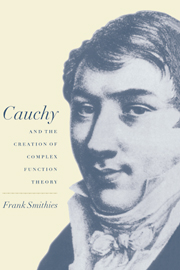Book contents
- Frontmatter
- Contents
- Introduction
- 1 The background to Cauchy's work on complex function theory
- 2 Cauchy's 1814 memoir on definite integrals
- 3 Miscellaneous contributions (1815–1825)
- 4 The 1825 memoir and associated articles
- 5 The calculus of residues
- 6 The Lagrange series and the Turin memoirs
- 7 Summary and conclusions
- References
- Notation index
- Author index
- Subject index
6 - The Lagrange series and the Turin memoirs
Published online by Cambridge University Press: 10 October 2009
- Frontmatter
- Contents
- Introduction
- 1 The background to Cauchy's work on complex function theory
- 2 Cauchy's 1814 memoir on definite integrals
- 3 Miscellaneous contributions (1815–1825)
- 4 The 1825 memoir and associated articles
- 5 The calculus of residues
- 6 The Lagrange series and the Turin memoirs
- 7 Summary and conclusions
- References
- Notation index
- Author index
- Subject index
Summary
6.1. In the present chapter we shall be mainly concerned with Cauchy's investigations of the Lagrange series, and his discovery that some of the ideas used there were much more widely applicable; they led him to his important results on the convergence of the Taylor series of an analytic function and on power-series expansions by implicit functions.
We shall begin by outlining some of the early work on the Lagrange series, referring to Lagrange's discovery of the series [1770a] and his application of it to Kepler's problem [1770b], to a paper by Laplace [1779] and the criticism of it by Paoli [1788], and to the first serious investigation of the convergence of the series by Laplace [1825]. We then describe Cauchy's first studies of its convergence in his [1827b] and [1827c], and we go on to the long memoir [1831d], issued in lithograph form during Cauchy's stay in Turin, and containing his results on the convergence of power-series expansions of both explicit and implicit analytic functions, together with his ‘calculus of limits’, better known today as the method of majorants. The memoir also contains extensive applications of his results to celestial mechanics, but we shall omit any discussion of these. The part of [1831d] with which we shall be concerned first appeared in print (with some small but significant revisions) in Cauchy's Exercices d'analyse in 1841; there is also a brief preliminary abstract [1831a], published in the Bulletin de Férussac.
- Type
- Chapter
- Information
- Cauchy and the Creation of Complex Function Theory , pp. 147 - 185Publisher: Cambridge University PressPrint publication year: 1997



